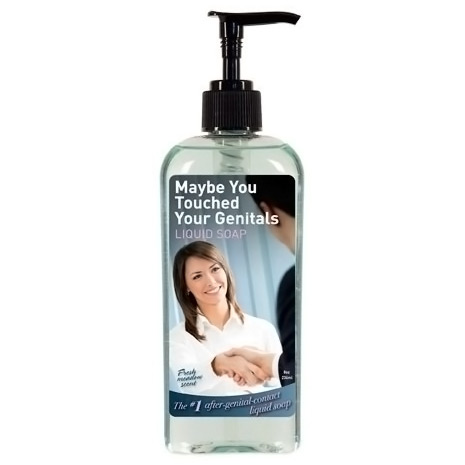General Discussion
Related: Editorials & Other Articles, Issue Forums, Alliance Forums, Region ForumsDoes Purell Breed Superbugs? The dirty truth (and the good news) on hand hygiene.

(Mother Jones) To hear the industry tell it, anti-microbial soaps are humanity's last best option in a war against germs that lurk everywhere. On a site called Fight Germs Now—"the official source on anti-bacterial hygiene products"—the American Cleaning Institute sings their praises, warning that "sometimes plain soap and water is not good enough." The fast-growing market for anti-bacterials—most of which rely on an active ingredient called triclosan—is estimated at $1 billion. Triclosan is also in items such as socks, yoga mats, cutting boards, ice cream scoops, and pencils. No wonder the Centers for Disease Control and Prevention (CDC) estimates that it's present in the urine of three-quarters of Americans.
But on December 16, the FDA issued a proposed rule that would require companies to provide "more substantial data to demonstrate the safety and effectiveness of antibacterial soaps" before selling these products. The move is in response to the mounting evidence that triclosan might not be as effective as manufacturers claim. Bill Schaffner, a professor of preventive medicine and infectious diseases at Vanderbilt University, points out that triclosan soap products are useless when it comes to most seasonal infections: They target bacteria, not the viruses that cause colds and flus. And they don't work any better on bacteria than standard soap—which also gets rid of viruses. In a 2008 review in the American Journal of Public Health, researchers scrutinized hundreds of hand hygiene studies and found "little evidence" that anything beat regular washing in reducing the symptoms associated with infectious gastrointestinal or respiratory illnesses.
Not only that, but there is strong evidence that anti-bacterial soaps contribute to antibiotic resistance. In 2004, a team of University of Michigan researchers found that exposing bacteria to triclosan increased activity in cellular pumps that the bugs use to eliminate foreign substances. These overactive excretory systems "could act to pump out other antibiotics, as well," says Stuart Levy, one of the study's authors and a leading researcher on antibiotic resistance at the Tufts University School of Medicine. That's a problem, since troublesome bacteria like streptococcus, staphylococcus, and pneumonia are already evolving defenses against our best weapons. Worse, there aren't enough new drugs in the production pipeline. Over the past 15 years, the FDA has approved just 15 new antibiotics—in the preceding 15 years, it approved 40. The World Health Organization now views antibiotic resistance as "a threat to global health security." And while triclosan's contribution to the problem hasn't been adequately studied, Levy believes it could be "significant."
.....(snip).....
After learning about all of this, I was worried I might have to abandon my habit of squirting Purell all over my hands every time I get off the subway. But there's no triclosan in Purell. In fact, most hand sanitizers rely on alcohol, which slays germs on contact instead of killing some and just weakening others, as the anti-bacterials do. Vanderbilt's Schaffner assures me that alcohol-based hand sanitizers "will absolutely not contribute to the problem of antibiotic resistance, since they are not antibiotics." .......................(more)
The complete piece is at: http://www.motherjones.com/environment/2013/12/germophobia-superbug-hygiene-soap-bacteria
Feral Child
(2,086 posts)Bleach. A mild solution is still used as a wound disinfectant, especially in MRSA relevant cases. If it works for wounds...
I foster feral animals. I use Dakin's as a hand disinfectant as well as a general household cleaner.
Blue_Tires
(55,445 posts)progressoid
(49,961 posts)
laundry_queen
(8,646 posts)It's a slightly misleading title. The majority of the article is about how terrible triclosan is - which is an antibiotic additive in soaps and other things (toothpastes too, believe it or not). Purell does NOT contain triclosan. It kills germs by way of alcohol - on contact, much in the same way bleach does. It does NOT breed antibiotic resistance.
However, as pointed out in the article, hand washing with soap is a good option because it gets off dirt and can wash off certain bugs (norovirus, c.difficile) that Purell isn't very effect against. Purell, however, is very effective against most viruses and bacteria, like the flu, maybe even more so than a quick hand wash.
Also: washing your hands with triclosan laced soap does not kill any more bacteria than washing with regular soap, which is why the FDA issued its statement in the first place. Triclosan has no proven benefit.